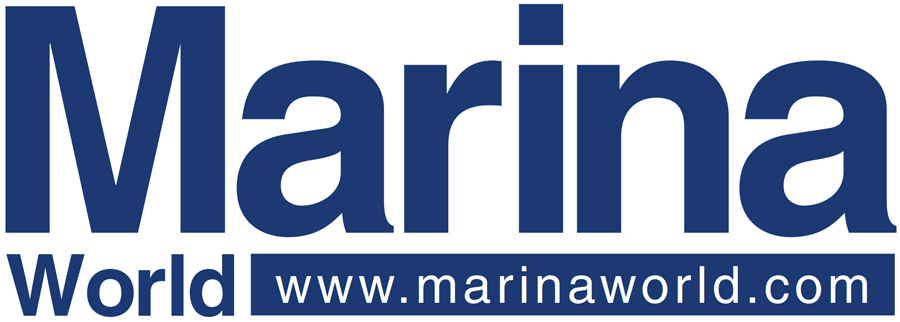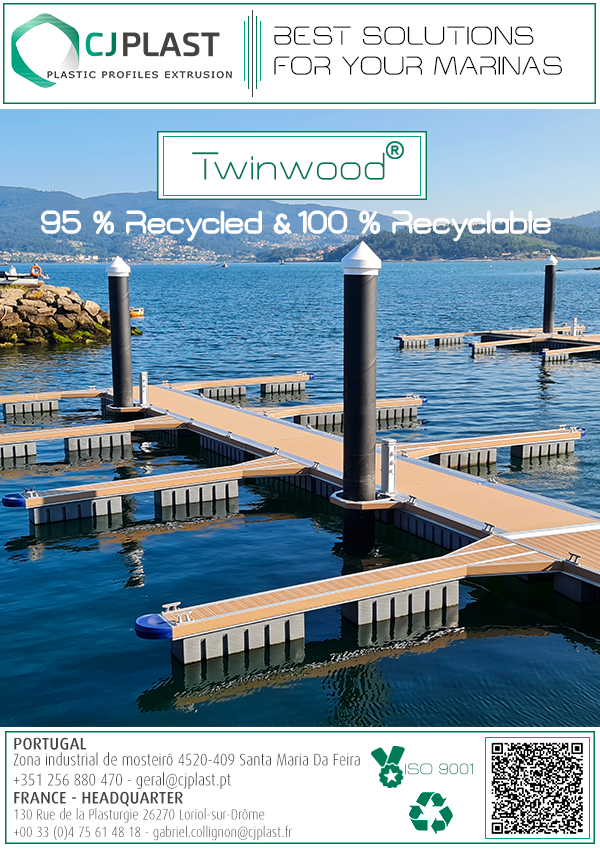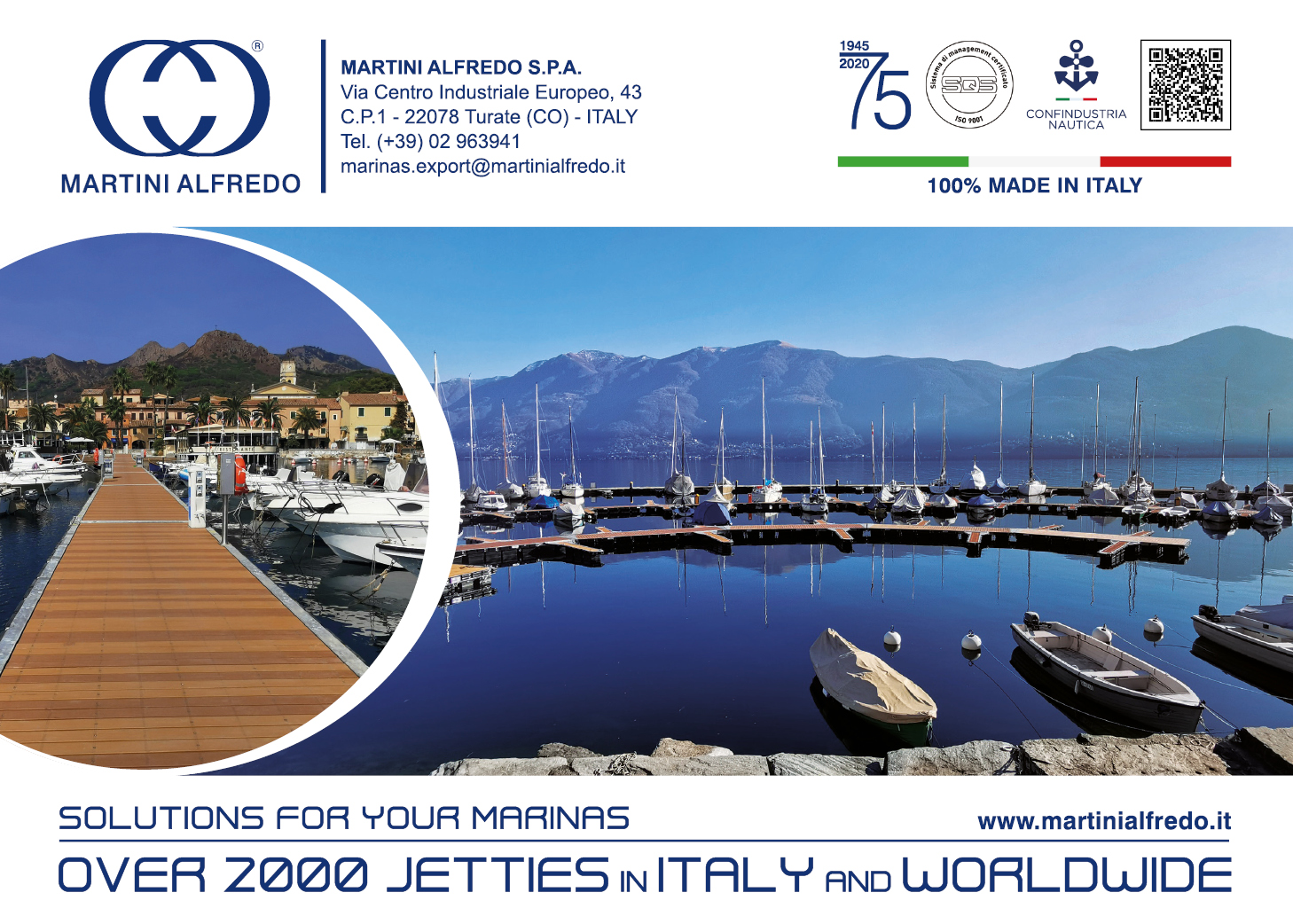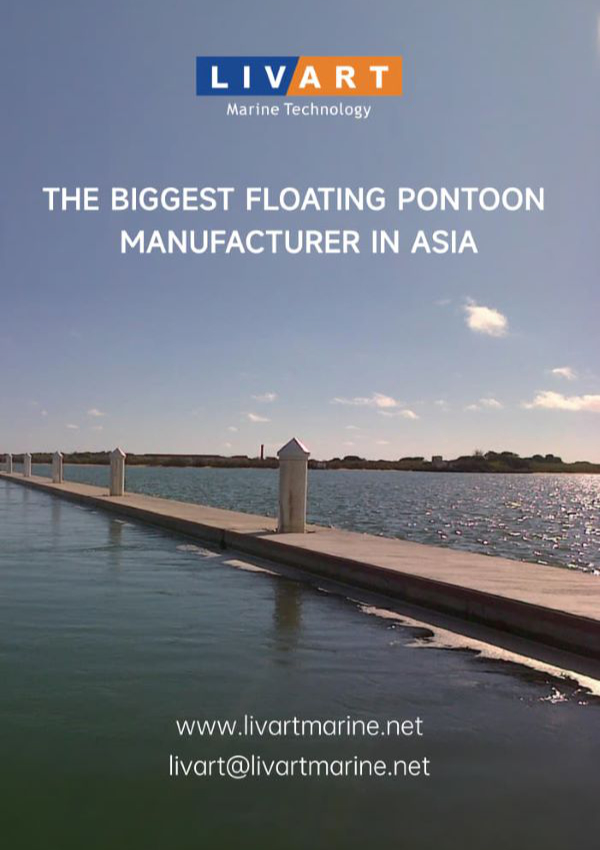Customers, culture, comms and carbon
The 2023 ICOMIA World Marinas Conference (IWMC) held at the Tivoli Conference Centre in Vilamoura, Portugal in October was hailed as one of the most successful events in the long-running series to date. Hosted by the Portuguese Association of Ports and Marinas (APPR) and expertly moderated by professional broadcaster Shirley Robertson, IWMC 2023 was held over three days and attracted more than 350 delegates from the international marina community.
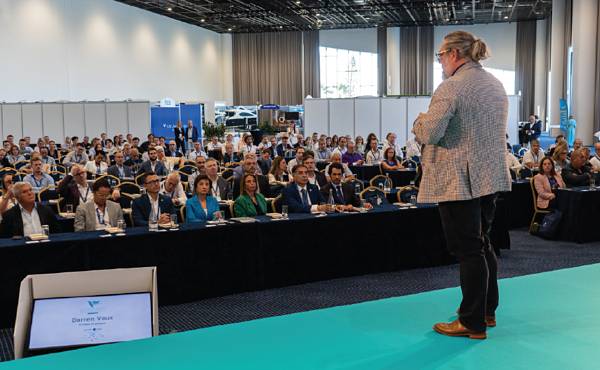
ICOMIA president, Darren Vaux, makes one of the opening addresses to a packed audience.
Although technology and its advantages played a major part in the conference discussions, emphasis was placed on the importance of people right from the outset. “Recreational boating enriches people’s lives,” said ICOMIA president Darren Vaux. “It’s not about ‘boats’ but about the sense of calm evident in being in and around the water – the increase in well being and the physical benefits. Recreational boating matters, and thus marinas matter.” ICOMIA Marinas Group (IMG) chair, Martinho Fortunato, took up the baton: “Industry must focus on people and not just technology. It’s very important to keep this in mind.”
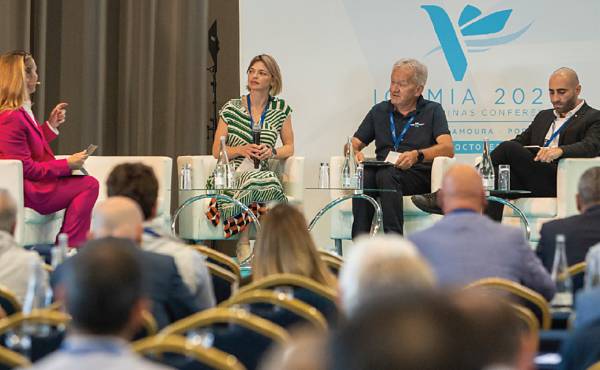
Left: (l to r) Moderator Shirley Robertson chairs a panel discussion with Elsa Nicol, Falco; Tone Britovsek, Marina Master; and Idan Cohen, Pick-a-Pier.
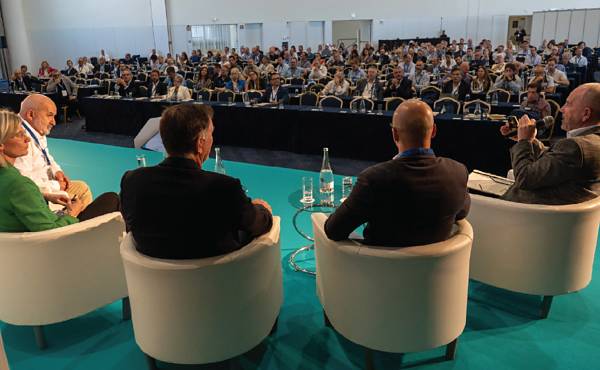
Discussing the industry around the globe (l to r) Oscar Siches, consultant; Suzanne Davies, MIA; John Hogan, Superior Jetties; Cédric Le Rest, MM&C: and Jon White, TYHA.
The customer base
“Marinas will be the hospitality hubs in the future and offer a marina ‘guest’ experience – let’s not call them ‘customers’,” urged Kalogerakis. But what of the new ‘guests’?
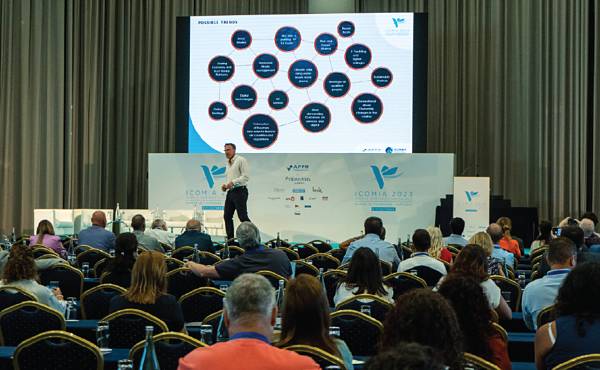
Dörschuck, D-Marin, speaking on industry trends.
According to Arturo Gutierrez, general manager (EMEA) for Freedom Boat Club (FBC), one in five club members graduates to boat ownership. FBC currently has 5,000 boats and 90,000 members and is welcoming increasing numbers of women and young people into its fold. There are significant financial advantages in having a Boat Club on a marina site and FBC sees a trend towards the marina being seen as a destination. In terms of demands, “people want to be more responsible and sustainability is important to them,” he said. “They also enjoy having a personalised experience on the water.”
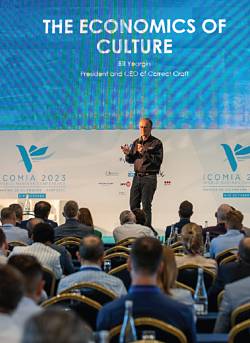
Bill Yeargin, Correct Craft
Charter also takes centre stage. “Charter is the most relevant platform for all of us for the future,” asserted Boot Düsseldorf director Petros Michelidakis revealing that, compared to 2020, there is a significant rise in the amount people are prepared to spend. In 2021 the average weekly spend was €4,267 and this is up by 32%. According to Sail Croatia, the most popular charter destinations in the world are Croatia (over 38%); Greece (over 28%); Italy; Turkey; EU other; Spain; France; and the Caribbean.
Smart technology
Digital technology plays a core part in our lives and, while marinas need to adopt ‘smart’ approaches and make best use of data, the message is clear that the customer is king. “Customers are more demanding. Mobile phones connect them and customers are self-confident and want to interact. They are in control. They book online, get instant confirmation and pay immediately,” said D-Marin CEO Oliver Dörschuck.
Smart marinas give us sensors, data analytics and other technology that collects, analyses and monitors data. Amongst other things, this can be used to optimise berth utilisation, manage energy consumption, monitor water quality and track weather conditions. “We can use these to create customer experience with ‘real’ online booking and payment, real time weather updates and on-demand concierge,” Kalogerakis noted.
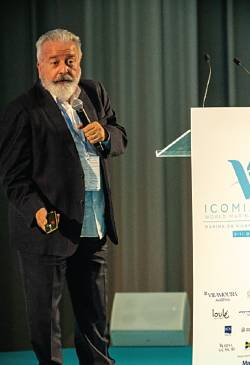
Yiannis Kalogerakis, JMK.
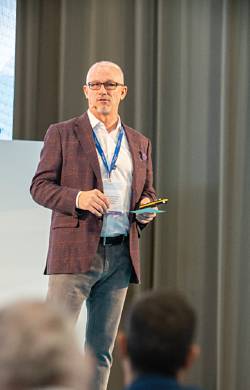
Frank Hugelmeyer, NMMA.
Balance is the key. “Some tech is important but if we don’t have human contact we are going to lose a lot. Being automated may be impressive but while clients appreciate the tech they also like having people to look after them during their stay,” said Isolete Correia. Stavros Katsikadis, managing director Lamda Marinas Investments, emphasised: “Smart technology has become essential but we need to listen, change, learn. We need to think about remotely controlled systems in marinas, i.e. things that are moved without people. Will there be fewer accidents? Technology is coming, and it’s coming fast.”
Marina infrastructure
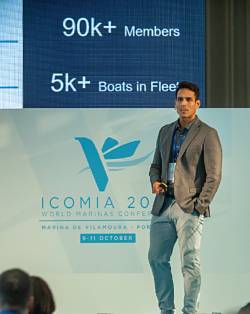
Arturo Gutierrez, Freedom Boat Club.
Patrick Lindley, CEO Grupo Lindley, advised opting for “the smallest environmental impact and the best investment in quality.”
Michael Shanley, president Golden Marine Systems, called for higher piling specifications when installing floating dock systems in hurricane risk areas and the need for forward-thinking on marina designs that will survive severe weather patterns. Speaking about the devastating effects that Hurricane Ian had on marinas in Fort Myers Beach, Florida he said “we are four to five years away from getting it sorted. We sustained $109 billion in damages in what was the deadliest hurricane in Florida since 1935.”
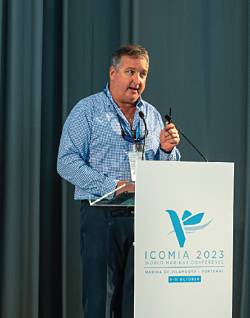
Michael Shanley, Golden Marine Systems.
“The key for the future is being very, very flexible. We are just ‘handling’ it now but we need to make sure our equipment is adaptable or can be easily traded or recycled,” he also noted.
Fuel and the environment
“A decarbonised boating future will evolve from a set of technologies and fuels already available. Some technologies are more adequate for some vessel sizes, uses, ambient conditions etc., in the short and long term. A mix of propulsion systems is envisioned,” said Ian Dobson of PIANC.
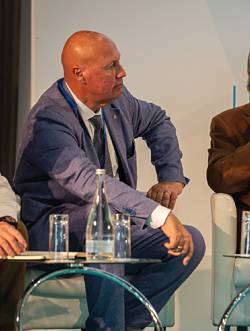
Roberto Perocchio, Assomarinas.
Frank Hugelmeyer, president and CEO of the US National Marine Manufacturers Association spoke on how to align decarbonisation policies. “We have to have cradle to grave data as we are facing regulation by ideology. We have to stay ahead of the regulatory sector where decisions will be made by judging other sectors, e.g. automotive.”
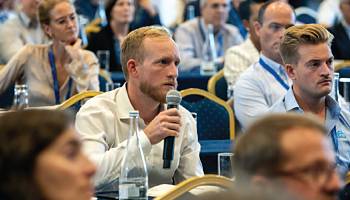
“We need to prioritise infrastructure for the distribution of sustainable fuels. This will achieve an instant and industry-wide carbon reduction of 28% for the entire fleet.”
Brands and owners
The rebranding of marinas as “tourist destinations” formed a central conference theme most specifically because, as tourism assets rather than general infrastructure, marinas will not only receive the acknowledgement they deserve as valuable players in the tourist sector but be in a stronger position to resolve concession issues.
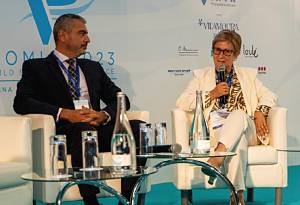
“The brand of a destination communicates values (sustainability, smartness) and marinas have to be aligned and be carriers of them,” said Alfonso Vargas Sanchez, Andalusian Academy of Regional Science. Oliver Dörschuck endorsed this. “As an industry, we need a strong voice, and innovation needs different people. We have to attract and retain talent, and build effective alliances and consolidations to create stronger brands.”
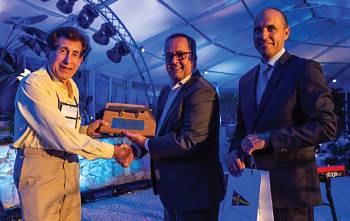
Joe Lynch, CEO ICOMIA, and IMG chair Martinho Fortunato (right) present marina consultant Dan Natchez with the 2023 ICOMIA Golden Cleat Award for Lifetime Achievement. Photo Carlos Muriongo.
Independent marina operators, representing by far the bulk of ownership in the private sector, also have significant strengths. “We feel the advantage of being independent is that we are quick to make decisions and to react. I feel we are closer to our town and our community. Continuity is better with independent marinas,” said Ingrid Fortunato, manager Marina de Lagos. Melanie Symes, secretary of TransEurope Marinas noted: “Independent marinas are optimal operators of their own space. They build a cultural capital and this gives them strength and resilience.”
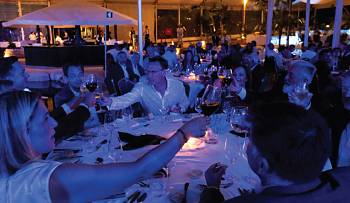
The gala dinner event. Photo Carlos Muriongo
Grand finale
IWMC 2023 had a broad reach to cover ‘big challenges, big opportunities, big decisions’ – and it suitably concluded by highlighting what must surely be the world’s most ambitious ongoing infrastructure project – Neom. A new landscape in Saudi Arabia, Neom will feature at least 12 coastal marinas, the first of which is Sindalah. Chief environment officer, Prof Richard Bush, outlined the vast scale of Neom, which covers a land area the size of Belgium, and described it as a “beautiful challenge”.
[p15]In and around the innovative major city of The Line, Neom development will be restricted to just 5% of the total area, leaving the remainder as national park. This will be the subject of re-wilding projects and reintroduction of animal species. “We plan to deliver a real liveable city by 2030,” he said, “where humanity and nature can thrive.”
The above article highlights content from amongst 72 presentations. Additional articles covering topics in greater depth will appear in future issues.
